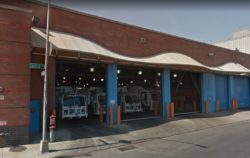
161 Varick Street in Brooklyn. Image credit: Google Maps.
Prime contractor agreed to process subcontractor’s extra work claim, but failed to file a timely claim. The Department of Sanitation in 200 awarded a contract to Arnell Construction Corp. to build two new sanitation garages for Districts 1 and 4 located at 161 Varick Street in Brooklyn. Arnell then signed a $3 million subcontract with Rad & D’Aprile, Inc. to perform masonry work on the project.
Work on the project was to commence on November 1, 2001. Due to various delays and interferences, Rad & D’Aprile was unable to complete its masonry work until over two years after the scheduled completion date. Rad & D’Aprile claimed that it incurred extra and additional costs. Rather than file its own claim, Rad & D’Aprile invoked the clause in the prime contract between the City and Arnell which permitted Arnell to include subcontractor Rad & D’Aprile’s claims for delay and extra work with Arnell’s claims. Arnell agreed to process Rad & D’Aprile’s claim, increased Rad & D’Arile contract by $100,000 to $3.1 million, and agreed that at the completion of the contract Arnell would incorporate Rad & D’Aprile’s extra work claims into Arnell’s overall claims against the City.
On August 11, 2010, Arnell filed a verified notice of claim totaling $15,092,471.40 against the City for extra work. The notice incorporated a claim on behalf of Rad & D’Aprile in the amount of $2,099,192. The City denied Arnell’s claim in its entirety and on December 13, 2010, Arnell commenced an action against the City in the Supreme Court on its own behalf and on behalf of Rad & D’Aprile.
On May 7, 2012 New York Supreme Court Justice Eileen Bransten dismissed Arnell’s complaint as time-barred. Under article 56 of the prime contract all claims against the City had to be commenced within six months after Sanitation issued a certificate of substantial completion. A timely complaint had to be filed prior to June 2008. Arnell had not filed its claim until 2010, more than 18 months beyond the period of limitation.
Rad & D’Aprile then sued Arnell for its failure to file the subcontractor’s extra work claims in a timely fashion. Rad & D’Aprile contended that Arnell breached its contractual duty of good faith and fair dealing. The Supreme Court accepted Rad & D’Aprile’s claim and refused to dismiss the complaint. Arnell appealed.
The Apellate Division, Second Department, upheld Rad & D’Aprile’s complaint and affirmed the Supreme Court. The Appellate Division ruled that, under the arrangement between Arnell and Rad & D’Aprile, Arnell had agreed to file Rad & D’Aprile’s extra work claim against the City. Its failure to do so supported Rad & D’Aprile’s claim of breach of good faith and fair dealing.
Rad & D’Aprile, Inc. v. Arnell Constr. Corp., 74 N.Y.S.3d 266 (2d Dep’t 2018).
By: Ross Sandler

